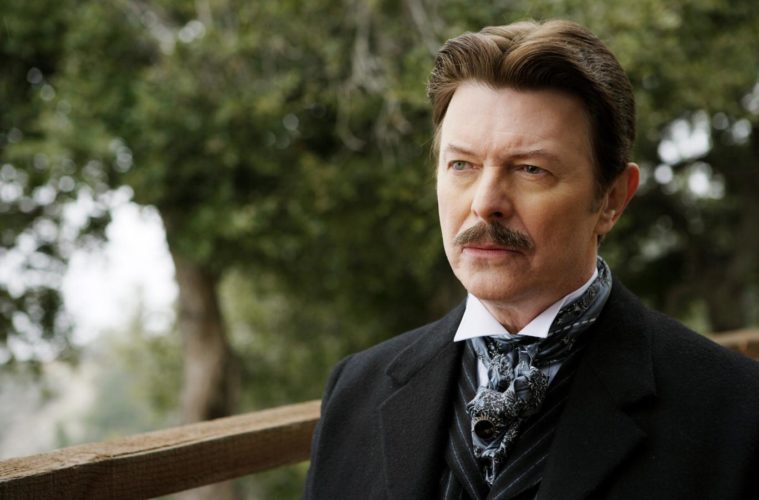
Dailies is a round-up of essential film writing, news bits, videos, and other highlights from across the Internet. If you’d like to submit a piece for consideration, get in touch with us in the comments below or on Twitter at @TheFilmStage.
Christopher Nolan remembers working with David Bowie at EW:
When we were casting The Prestige, we had gotten very stuck on the character of Nikola Tesla. Tesla was this other-worldly, ahead-of-his-time figure, and at some point it occurred to me he was the original Man Who Fell to Earth. As someone who was the biggest Bowie fan in the world, once I made that connection, he seemed to be the only actor capable of playing the part. He had that requisite iconic status, and he was a figure as mysterious as Tesla needed to be. It took me a while to convince him, though—he turned down the part the first time. It was the only time I can ever remember trying again with an actor who passed on me. I petitioned to let me explain why he was the right actor for it. In total honesty, I told him if he didn’t agree to do the part, I had no idea where I would go from there. I would say I begged him.
Also, Tilda Swinton discusses the impact of Davie Bowie:
As one NYC theater emerges, The Ziegfeld announces it will no longer be a movie theaters, NY Post reports:
It’s fade to black for Midtown’s famed Ziegfeld movie theater — but the iconic venue at 141 W. 54th St. will be reborn as a spectacular high-end event space, The Post has learned. The new Ziegfeld Ballroom will be a mecca for society galas and corporate events, to open in fall 2017 after a two-year renovation of the space.
The skies of Sicario:
New Directors/New Films have announced their initial 2016 line-up, featuring Neon Bull, The Fits, Demon, and more.
With Inside Llewyn Davis now on Criterion, read Kent Jones‘ essay:
Like quicksilver in a nest of cracks, the films of Joel and Ethan Coen flow and reverse course at speeds too fast for the mind to track. These artists put a lot of energy into creating movies that can be neither cornered nor pinned down, and that are impossible to file under this or that form, outlook, or stance. What begins as a Dashiell Hammett–inspired mood piece (Miller’s Crossing, 1990) suddenly explodes into passages of eye-popping absurdism, which give way to vaudeville-inspired showstoppers, which imperceptibly transform into passages of awed mystical contemplation, which shade into tragedy and then back again to the hard-boiled, the absurdist—and the suggestion of endlessness. A portrait of late-sixties middle-class Jewish life in the Minneapolis suburbs (A Serious Man, 2009) keeps shifting registers—without apparent effort and so deftly—from the lovingly Proustian to the savagely satirical to the ineffably sad and strange, and throughout we are left to consider the relationship of the action to the Yiddish “folktale” that precedes it. The seemingly straightforward and comparatively lite Burn After Reading (2008) takes so many unexpected turns away from the satire of Washington bureaucratic culture it appears to be—into obsessions with fitness, the oddness of being a tongue-tied and uneducated American, the greater oddness of old-boy men’s club culture and home-manufactured sexual paraphernalia—that by the time you come out of the film, your head is spinning like a gyroscope.
Celebrate the 70mm release of The Hateful Eight with a beautiful video from the projection booth:
LA Review of Book‘s K. Austin Collins analyzes Spike Lee‘s Chi-Raq:
Chi-Raq, Lysistrata: these words title the art of war. But is the South Side a war zone? Activists have long bristled at this comparison, and for good reason. War, to Americans, implies occurrences “over there,” beyond our borders. And war is something you can get politicians to care about. The title of Lee’s film suggests that he finds the comparison valuable, nevertheless, and this determines his filmmaking, which fills the world of Chi-Raq with the decrepit bodies of former gangsters in wheelchairs — men who could pass as extras in Oliver Stone’s Born on the Fourth of July — as well as the constant scatter of gun shots on and off-camera. The film is breathless, urgent. Lee starts us off with a rap overture, emblazoning the screen with its lyrics (“Police siren everyday / People die everyday …”) before issuing a call to order: “This Is An Emergency.”

